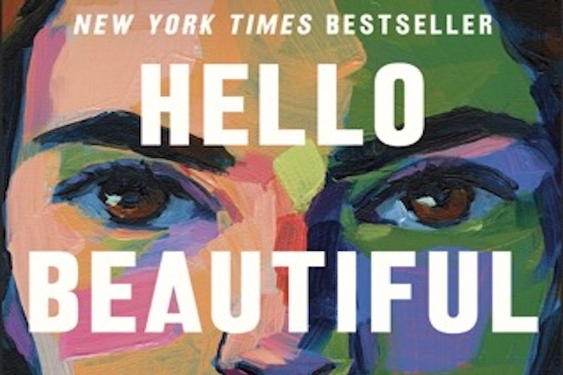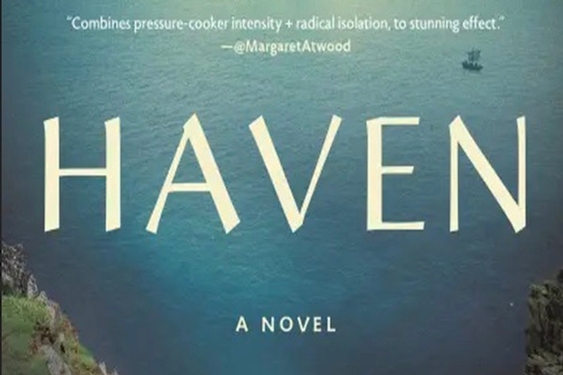If you’re still searching for a sliver of good news to take away from 2020 — good news that bridges partisan divisions, cultural chasms and pandemic procedures — consider this tidbit: We are all probably reading way more books these days. In fact, according to NPD BookScan, sales of print books climbed nearly 10 percent in the past 12 months. Sure, a majority of those sales went to e-monoliths, not your neighborhood booksellers. But, you know, baby steps. The even better news is 2021 is ready to feed that renewed appetite. Here are 20 or so books to carry us through a new, hopefully saner y
“A Swim in a Pond in the Rain” by George Saunders
The great Oak Forest, Illinois storyteller returns with a clever bit of New Year self-betterment — an appreciation of classic Russian short stories, as adapted from his creative writing class at Syracuse University. (Jan. 12)
“Remote Control” by Nnedi Okorafor
Direct from Flossmoor, Illinois. One of the most original, prolific and readable sci-fi/fantasy novelists around returns with this slender, touching African-set story about a young girl who finds herself the adopted daughter of Death himself. (Jan. 19)
“Let Me Tell You What I Mean” by Joan Didion
Not exactly fresh work, but then, so what? Here are 12 previously uncollected essays, many from early in the 86-year-old’s landmark career, when her placid, ennui-filled voice was still being established. Subjects include Martha Stewart, Nancy Reagan, hippies and her own failures as a fledgling writer. (Jan 26)
“Four Hundred Souls: A Community History of African America, 1619-2019” edited by Ibram X. Kendi and Keisha N. Blain
The excellent concept alone is hard to deny: Four hundred years of Black America addressed by 90 writers, each taking on a five-year period of American history. Subjects veer from the famous (Kanye West) to lesser-known activist collectives. (Feb. 2)
“The Kindest Lie” by Nancy Johnson
This debut novel by the former journalist (and current Chicagoan) tells the story of a Black engineer from the South Side who sets out to find the child she gave away. Set after the 2008 presidential election, it digs into the questions of class and race, urban and rural, that consumed the years to follow. (Feb. 2)
“Under a White Sky: The Nature of the Future” by Elizabeth Kolbert
Our finest journalist on climate change (“The Sixth Extinction”) returns with a look at the scientists and engineers trying to innovate our way out of an environmental catastrophe. No surprise, perhaps, it opens with the Great Lakes and a new look at the Chicago River. (Feb. 9)
“A Tip for the Hangman” by Allison Epstein
This Chicago writer’s fizzy debut is a Tudor espionage tale, set among spies close to Mary, Queen of Scots. One of them is Christopher Marlowe, whose spy work bankrolls a rather promising theater career. It’s more of a clever Netflix binge than a Hilary Mantel historical masterpiece — and that’s perfectly fine. (Feb. 9)
“Unrequited Infatuations: Odyssey of a Rock and Roll Consigliere” by Steven Van Zandt; “Vibrate Higher” by Talib Kweli; “Stories to Tell” by Richard Marx
I have a weakness for musician autobiographies. Profound or unreadable, I try to read them all. This year, we get tales of the Jersey Shore from E Street Band cornerstone (and “Sopranos” co-star) Van Zandt (Sept. 28), and the early days of hip hop from Kweli, whose work with Mos Def as the duo Black Star has been a contemporary milestone. (Feb. 16). But the most entertaining music memoir promised to be “Stories to Tell: A Memoir” by Marx. If you follow him online you know — the North Shore balladeer is blunt. (July 6)
“Klara and the Sun” by Kazuo Ishiguro
Always an event. The first novel in six years from the Nobel Prize-winning author of “Remains of the Day” and “Never Let You Go” is a characteristically aching take on technological progress and relationships, told from the point of view of an artificial intelligence watching the world pass by from its perch on a store shelf. (March 2)
“Who Will Pay Reparations on My Soul?” by Jesse McCarthy
My vote for the most underrated young critic today goes to this Harvard instructor (and editor at the Chicago literary journal The Point) whose excellent collection of essays on Black aesthetics, from obvious (Toni Morrison) to fleeting (trap music), reads like a landmark. (March 9)
“New York, New York, New York: Four Decades of Success, Excess and Transformation” by Thomas Dyja
The Chicago native’s 2013 history, “The Third Coast: When Chicago Built the American Dream,” has become a local classic. This ambitious return moves east, charting the cultural tidying of New York City, but as with “Third Coast,” it’s partly about the vibrancy that’s lost when a city tightens up and flies straight. (March 16)
“A Little Devil in America: Notes in Praise of Black Performance” by Hanif Abdurraqib
The most important cultural critic in America right now? This writer gets my vote. From his home in Columbus, Abdurraqib — whose previous book, on a Tribe Called Quest, was one of the best of 2019 — has delivered another winner, a mix of memoir and social criticism, arguing for the centrality of Black performance, from the gestures used in a game of cards to the howling female backup vocals in the Rolling Stones’ “Gimme Shelter.” (March 30)
“Philip Roth: The Biography” by Blake Bailey
Before he died in 2018, the legendary novelist told Bailey — whose works on John Cheever and Richard Yates made him the go-to biographer of the white male 20th century literary lion — he didn’t want to be sainted. He just wanted to be made interesting. So Roth gave Bailey remarkable access to his papers and friends. Mission accomplished: Got a copy the other day, haven’t put it down since. (April 6)
“Blow Your House Down: A Story of Family, Feminism and Treason” by Gina Frangello
My bet for breakout of the year. The Chicagoan’s memoir takes on gender expectations and marital affairs in such a brutal, self-lacerating candor, you wonder who should play her in the movie. (For the record, Charlize Theron — she even blurbs the cover.) (April 6)
“The Man Who Lived Underground” by Richard Wright
Bits of this novel appeared here and there over the years, but the novel itself — completed in the 1940s, around the time the Chicagoan was writing such landmarks as “Native Son” and “Black Boy” — remained unpublished until now. The story: A Black man is accused falsely of murder by Chicago police and tortured into a confession, but escapes, and moves into the sewers. (April 6)
“Empire of Pain: The Secret History of the Sackler Dynasty” by Patrick Radden Keefe
Readers of “Say Nothing” — the New Yorker mainstay’s astounding 2019 study of the Troubles in Ireland — will salivate at the premise here: The story of the Sackler family, whose history of philanthropy and arts patronage is now being overmatched by its uglier legacy of manufacturing OxyContin, the painkiller that deepened the opioid crisis. (April 13)
“The Free World: Art and Thought in the Cold War” by Louis Menand
One of those massive, sweeping, everything-under-the-sun social histories — albeit from the kind of master who can pull it off. This is nothing less than the story of how the United States transformed internationally into an intellectual and cultural force. It’s the New Yorker staff writer’s long-promised follow-up to his 2001 Pulitzer masterwork “The Metaphysical Club.” (April 20)
“Whereabouts” by Jhumpa Lahiri
The Pulitzer winner’s first novel in a decade, since she moved to Rome and began writing primarily in Italian. Indeed, this book itself — a Virginia Woolf-ish story of a woman simply moving through her day, with all the personal complexities and everyday mundanities that suggests — is a translation from Italian. (April 27)
“The Secret to Superhuman Strength” by Alison Bechdel; “My Begging Chart” by Keiler Roberts
A pair of great autobiographical cartoonists return — one (Bechdel, of “Fun Home,” May 4) acclaimed, one (Roberts, an instructor at School of the Art Institute of Chicago, May 18) a well-kept secret. Bechdel takes on her love of fitness, while Rogers, a master of the quotidian, finds funny truths in Barbies, ceiling fans, imaginary friends.
“On Freedom: Four Songs of Care and Constraint” by Maggie Nelson
Fittingly, considering the five-alarm fire playing out every day in the country, it’s a good time for essayists, and Nelson is among the originals. The author of such influential works as “The Argonauts” and “The Red Parts” considers our obsession with the idea of freedom, from its capacity to thrill to its ability to disgust. (Sept. 7)
“Bewilderment” by Richard Powers
We don’t know much this follow-up to the Pulitzer-winning masterpiece, “The Overstory.” But we know, in keeping with the Evanston native’s study of the natural world, it’s about a far-reaching astrobiologist who decides that the only way to deal with his troubled son is by taking him to another planet. (Sept. 21)
“Crossroads: A Novel (A Key to All Mythologies, Volume 1)” by Jonathan Franzen
Praised and loathed in equal measure, the Western Springs-born novelist returns to his favorite milieu, the ’70s-set family epic. Supposedly the beginning of the end — his goodbye to novels — it’s also the first of a trilogy. And guess what: It’s set in Chicago. (Oct. 5)
___
(c)2021 the Chicago Tribune
Visit the Chicago Tribune at www.chicagotribune.com
Distributed by Tribune Content Agency, LLC.




